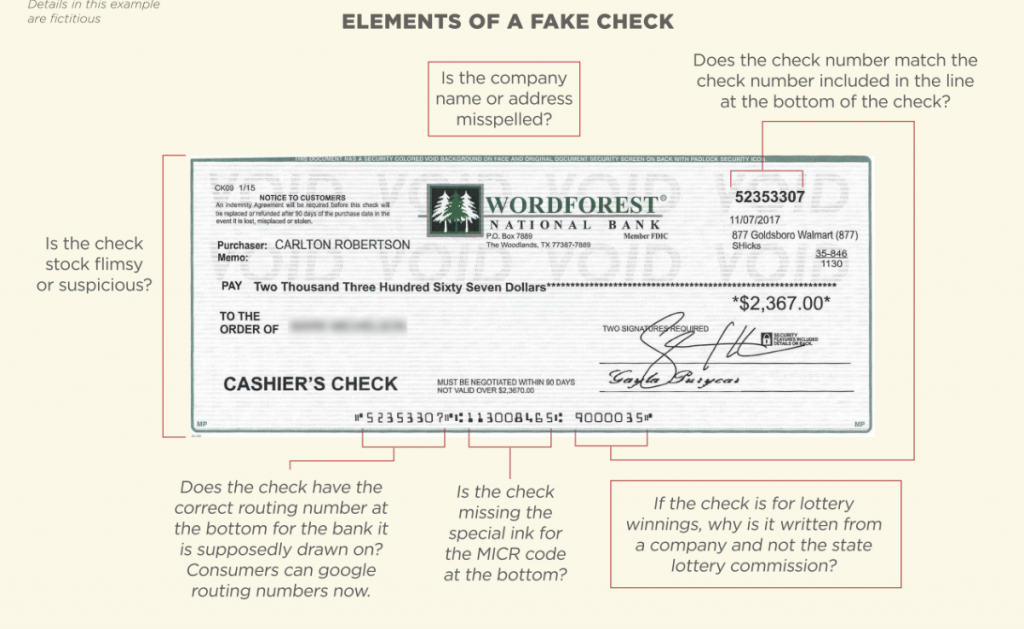Fake Check Study Reveals Growing Problem
Better Business Bureau did an in-depth study which found that while consumers may write fewer checks in this era of electronic financial transactions, fake check scams are on the rise. Fake checks are used in a variety of frauds, from employment scams to prize and sweepstakes fraud. In all cases, victims deposit the check and send money back to scammers. BBB warns consumers to be on guard against these serious and pervasive frauds and their perpetrators.
The investigative study—“Don’t Cash That Check: Better Business Bureau Study Shows How Fake Check Scams Bait Consumers”—looks at how fake checks dupe consumers. It digs into the scope of the problem, who is behind it, and the need for law enforcement and consumer education to address the issue. Read the complete report here.
Scammers often succeed because consumers don’t realize:
Crediting a bank account does not mean the cashed check is valid. Federal banking rules require that when someone deposits a check into an account, the bank must make the funds available right away—within a day or two. Even when a check is credited to an account, it does not mean the check is good. A week or so later, if the check bounces, the bank will want the money back. Consumers, not the fraudsters, will be on the hook for the funds.
Cashier’s checks and postal money orders can be forged. A cashier’s check is a check guaranteed by a bank, drawn on the bank’s own funds and signed by a cashier. If a person deposits a cashier’s check, the person’s bank must credit the account by the next day. The same holds true for postal money orders. Scammers use cashier’s checks and postal money orders because many people don’t realize they can be forged.
Fake check fraud is a huge problem, with complaints to regulatory agencies and consumer watchdog groups doubling over the last three years.
Frauds employing fake checks is rapidly growing and costing billions of dollars. Fake checks were involved in 7% of all complaints filed with BBB’s Scam Tracker. The number of complaints received by the Federal Trade Commission’s Consumer Sentinel database and the Internet Fraud Complaint Center more than doubled between 2014 and 2017.
Based on complaint data trends, the study suggests that there may be over 500,000 victims of counterfeit checks in 2017.
The study found the fraud affects victims of all ages and income levels, but consumers between 20-29 reported being victimized by the scam more than consumers of any other age range.
The National Consumers League, which also receives complaints from fraud victims at fraud.org, found that fake checks complaints in 2017 were up 12% and was the second most common type of complaint over all, after online order issues.
Nigerian gangs appear to be behind most of this fraud, often using romance fraud victims and other “money mules” to receive money from victims. Many fake checks and money orders are shipped to the U.S. from Nigeria.
The report recommends:
- Organizations such as BBB and regulatory agencies should do more to provide fake check fraud prevention education.
- With wide-scale use of money mules and others to assist in frauds, it would be useful for law enforcement agencies to work collaboratively to both identify these individuals and to take action to ensure that they end these activities.
- Investigative agencies may need more resources to effectively prosecute fake checks and other widespread frauds.
- Continued law enforcement coordination and training with enforcement counterparts in Nigeria and elsewhere should remain important and should be strengthened.
- Banks and financial institutions might consider more collective efforts to educate their customers about fake check frauds.
What to do if you have deposited a fake check into your account:
Notify your bank or the bank that appears to have issued the check. File a complaint:
- Better Business Bureau
- Federal Trade Commission, or call 877-FTC-Help
- Internet Crime Complaint Center, or IC3
- U.S. Postal Inspection Service
- Western Union, (800) 448-1492
- MoneyGram, (800) 926-9400
- Green Dot, (866) 795-7597
- Canadian Anti Fraud Centre, toll-free from US at 1-888-495-8501
Victims who are seniors or other vulnerable adults may be able to obtain help through Adult Protective Services, which has offices in every state and many counties. Find a local office at www.elderjustice.gov.
Read these tips to avoid becoming a scam victim.
















